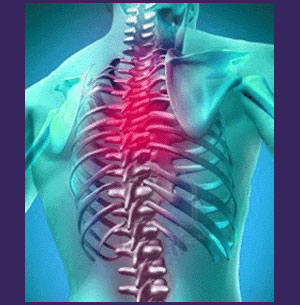
Back pain from falling is one of the most common reasons given to explain traumatic back injury. Falling down can apply tremendous force to the body and this force can be compounded when the fall occurs from a height, on a hard surface or down stairs. Falls can enact soft tissue injuries, such as strained back muscles or herniated discs, but can also fracture vertebrae if the force is concentrated on a small area of the spine.
This discussion examines the consequences of falls on the spinal anatomy and why falling down is cited as one of the main sources of back injury.
Back Pain from Falling Scenarios
Falling down can occur due to a wide variety of reasons:
People may fall due to health issues, inner ear concerns and pre-existing injuries.
Other people fall due to excessive alcohol consumption, as well as illicit or prescription drug use.
Litigation is often commenced due to slip and falls on private property, often involving debris in public walkways or defectively paved surfaces. Lawyers have worked for decades to perfect these types of lawsuits to make themselves rich and provide some tiny semblance of financial compensation for their clients.
Wet or icy areas, as well as stairs, are also often blamed for causing falls in a significant number of people, especially when they are in a rush.
No matter how a fall occurs, it is worse with each passing year. Older adults do not handle the stress of falling down well and many end up with injuries that may endure far into the future.
Back Pain from Falling Facts
Falls can injure; this is a fact. However, the body is designed to heal and recovery from physical damage is the prime directive of the human anatomy. Even the worst injuries from falls should heal and not leave lasting pain in their wake. When I hear of patients who blame years or decades of intractable pain on a seemingly insignificant fall, I usually think that a back pain trigger is the actual cause of prolonged symptoms. This is not always the case, but does embody many nocebo injuries that occur due to the psychological trauma of a fall and not the actual fall itself.
Of course, one must also account for secondary gain that might come about from a fall. Some patients subconsciously or consciously embrace the benefits resulting from their unfortunate experience, such as the ability to stay home from work, the ability to shirk responsibility and of course, the ability to benefit financially from the misfortune.
Chronic back pain can result from serious injuries which do not heal well, or at all, although these cases are rare and do not represent the average patient complaint. A terrible fall down stairs or on concrete can certainly cause lasting anatomical damage.
The elderly are at particular risk from falls, often suffering terrible injury from even minor incidents. Remember too that fractures can occur in older spines and may not be symptomatic immediately or at all. This is why it is crucial to use diagnostic imaging to ascertain whether a fracture has indeed occurred every time an elderly person falls.
Unlike most forms of trauma, falling virtually always occurs on a completely unyielding surface. This makes the body absorb the entire shock, exponentially increasing damage that might have been done from the force of an equal trauma where the force can be dispersed through movement.
Falling Down Back Pain
Falls are traumatic to the body and the mind. They often act as ideal trigger mechanisms for psychological pain syndromes to begin throughout the body, regardless of the occurrence of actual injury or not. In some of these cases, damage may have occurred and will eventually heal, only to be replaced completely by psychogenic back pain. In other cases, no actual injury was suffered and the immediate onset of symptoms is directly tied to a psychosomatic expression from the beginning.
A stern warning to those considering litigation after a fall: I have witnessed many instances in which patients were talked into feeling permanently damaged by their lawyers and their puppet doctors, all in an effort to bolster the monetary value of a lawsuit. While you may deserve compensation and would like to get paid, just remember that the emotional damage done to you, if you truly believe that you are damaged goods, will last long after the litigation has finished, the money has run out and your lawyer has gone on their annual vacation, courtesy of your suffering.
Always make recovery your first priority and never let a lawsuit keep you injured for longer than need be. The potential consequences of this mindset are just not worth it in the long run. Try to put back pain from falling behind you and move forward in life.





